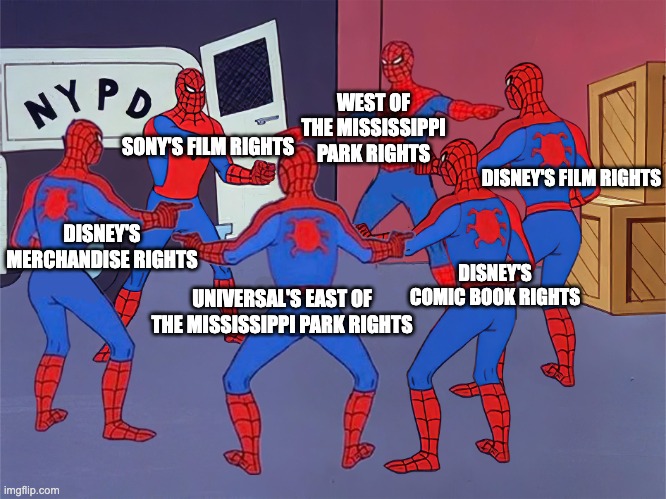
Long before Disney’s Marvel films dominated the box office, Marvel, still an independent company, sold the rights to Spider-Man to Sony in 1998. Marvel retained the comics rights, but Sony could produce films with the character and sell merchandise – if you’ve ever wondered there always seems to be a new Spider-Man film on the horizon, it’s because a quirk of the purchase is to retain the film rights, Sony must produce a new Spider-Man movie every 5 years. Where things became complicated, however, was when Disney purchased Marvel in 2009. As a result of this 4-billion-dollar deal, Disney gained the comic rights that Marvel retained, but Sony still had the film and merchandising rights to Spider-Man. However, a financially difficult period led Sony to sell the merchandising rights for Spider-Man to Disney in 2011, while still retaining the film rights.
As Disney found unprecedented success with the Avengers franchise, audiences were clamouring for Spider-Man to be included in the films. Most people would assume that since Disney had purchased Marvel, and Spider-Man was a Marvel character, it should be well within Disney’s rights to include him, but those with knowledge of the IP situation knew that would require Sony to play ball. Sony had experienced its own success with Spider-Man films but was not achieving Disney’s level of financial success. The Amazing Spider-Man starring Andrew Garfield was released in 2012 and brought in 758 million USD. While successful, it paled in comparison to Disney’s 2012 release of The Avengers, which generated $1.519 billion. The Amazing Spider-Man 2, released in 2014, also underperformed as compared to Marvel releases of the same year.
As a result, Disney and Sony negotiated a novel deal to bring Spider-Man into the Marvel Universe, in which Sony was entitled to 95% of the gross proceeds of stand-alone Spiderman-Films, leaving Marvel with 5%. This marriage seemed to be a success until 2019 when Disney requested a greater revenue share, and the two sides were unable to negotiate a deal. Any future Spider-Man films seemed dead in the water until star Tom Holland and mounting public pressure encouraged both sides to come to a deal that would allow for at least 2 more Marvel Spider-Man movies. If Sony does decide to stop cooperating with Marvel and move forward with their own Spider-Man franchise, Disney’s right to other characters in the MCU would mean that Sony could not refer to any of the other characters owned by Disney in their films.
More complications exist with the rights to Spider-Man as it relates to theme parks. The theme park rights to Spider-Man were not included in the original deal made between Marvel and Sony. Before Marvel was purchased by Disney, it sold the theme park rights to its characters to NBCUniversal to use in their Universal Studios theme park. However, Universal was only granted these rights east of the Mississippi, where they were building their Marvel Superhero Island at Universal Orlando. The exclusivity rights east of the Mississippi stated that after an initial 2-year period, any other theme park could license the rights to any Marvel characters not in use by Universal. Universal built a Spider-Man ride, meaning Disney may not build a Spider-Man ride in Walt Disney World (they are permitted to build an upcoming Guardians of the Galaxy rollercoaster, as those characters are not in use at Universal Orlando). West of the Mississippi however, the theme park rights were essentially up for grabs. Any other theme park could license Marvel characters whether they were in use by Universal or not. The only catch is that those other theme parks (on both sides of the Mississippi) could not use the word Marvel in any of the attractions or promotions, likely to avoid confusion with Universal’s Marvel Super Hero Island. As a result, Disneyland has recently opened Avengers Campus, where all Marvel characters are represented.
While much of the focus of Intellectual Property law is on protecting the rights of the copyright holder, this case illuminates how copyright law also operates to allow copyright holders to divide, license, and sell their rights in complex and diverse ways. In my opinion, this saga illustrates a double-edged sword of IP law. While it can be beneficial to creators to be able to sell some rights to their property and retain others (as Marvel initially did), when rights are spliced to such as degree it can create problems down the line when companies are bought and sold. Also, while diversifying ownership can potentially lead to greater creative output, when owners of various rights are unwilling to cooperate it can stifle innovation. To laypeople, Spider-Man is Spider-Man. One character, created by Marvel. But in the eyes of the law, Spider-Man is a split baby. That the ownership has been chopped up to such a degree likely seems inefficient to most people. While one method of combatting these complications would be to avoid selling IP rights in perpetuity, this too comes with risk. If Marvel had sold the film rights to Sony with a caveat that the agreement would be up for renegotiation every 5 or 10 years, Disney would have had the opportunity to regain those rights. However, doing so likely would have been Marvel in a much worse bargaining position and resulted in a poorer deal. As IP law stands, copyright holders will have to balance these risks when considering selling all or part of their rights, and the Spider-Man saga will likely be an illuminating example of the complications that can arise.
Sources:
https://www.sec.gov/Archives/edgar/data/1262449/000119312510008732/dex1057.htm
https://variety.com/2019/film/news/sony-marvel-tom-holland-spider-man-1203351489/
https://variety.com/2019/film/news/sony-marvel-tom-holland-spider-man-1203351489/
 Copyright & Social Media
Copyright & Social Media Communications Law
Communications Law